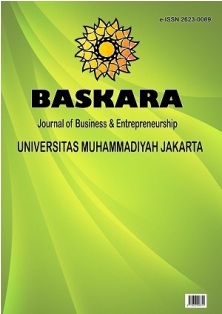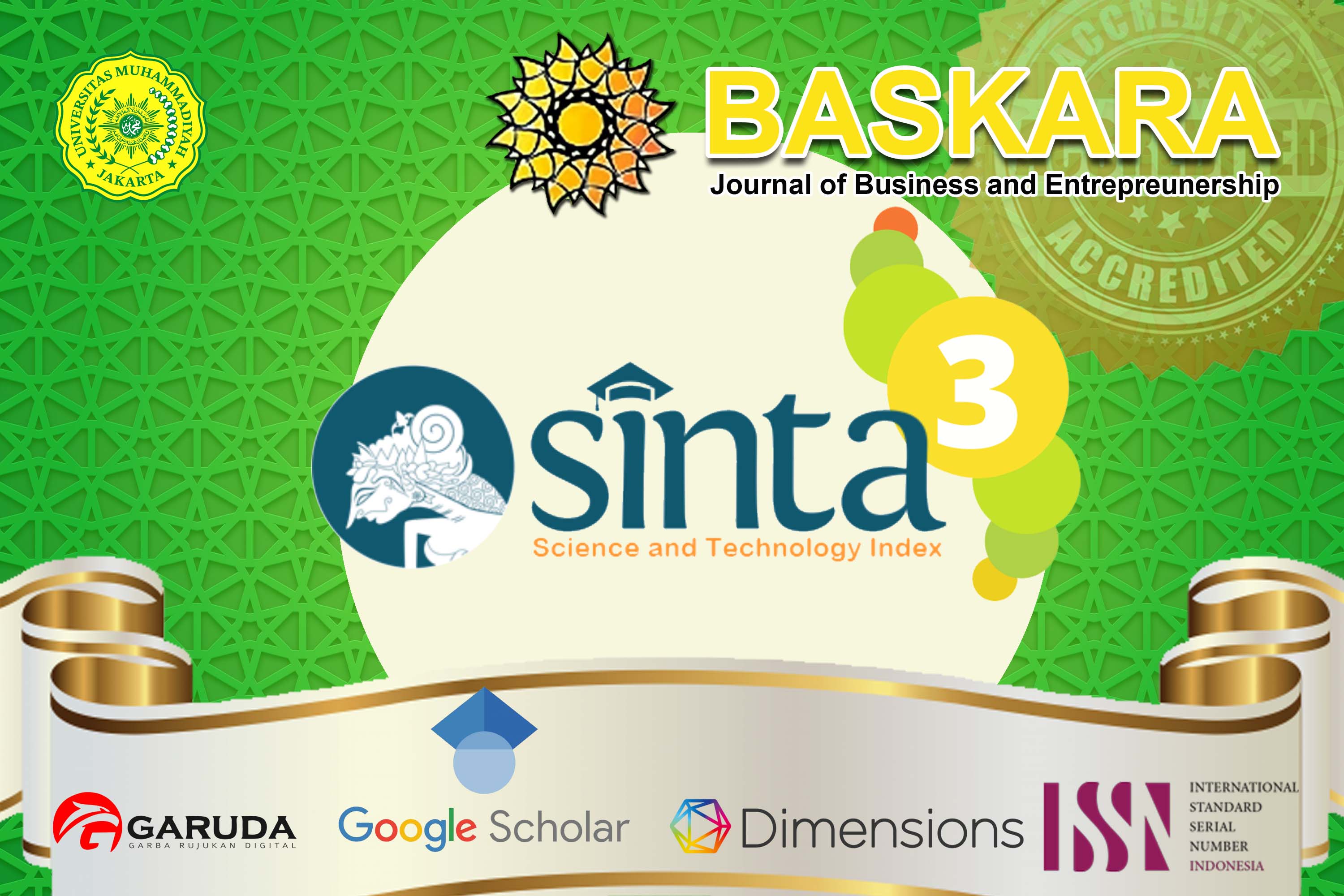Branding Islam dan Religiusitas Individu Pada Keputusan Nasabah Dalam Menggunakan Produk Bank Syariah
DOI:
https://doi.org/10.54268/baskara.v2i1.6197Keywords:
Branding, Islam, Keputusan, Religiusitas, SyariahAbstract
Minat masyarakat kepada praktik ekonomi syariah di Indonesia terlihat menggembirakan, terlihat dari banyaknya pertumbuhan lembaga bisnis dengan prinsip Syariah seperti Perbankan Syariah, hingga sektor bisnis Perhotelan Syariah, salahsatunya BMT Amanah Syariah di Kota Bekasi. Fakta menariknya, sebagian nasabah tidak memahami prinsip muamalah dalam keuangan syariah ketika memutuskan menjadi nasabah. Penelitian ini bertujuan mengukur pengaruh branding Islam dan religiusitas individu terhadap keputusan dalam menggunakan produk bank syariah. Metode yang digunakan adalah kuantitatif deskriptif dan verifikatif, dilakukan selama Desember 2019- Januari 2020, Teknik pengumpulan data melalui penyebaran kuesioner, wawancara singkat dengan narasumber, didukung dokumen dan referensi dari buku-buku, jurnal dan informasi lain. Hasil Penelitian diperoleh Branding Islam dan Nilai Religiusitas berpengaruh terhadap Keputusan Nasabah dalam memutuskan penggunaan produk keuangan syariah di BMT Amanah Syariah. Dari hasil olah data SPSS uji F, diketahui bahwa Hipotesis aternatif diterima artinya Branding Islam (X1) dan Religiusitas Individu (X2) secara simultan berpengaruh terhadap Keputusan Konsumen (Y). Kemudian juga diketahui bahwa Branding Islam (X1) dan Religiusitas Individu (X2) memberikan pengaruh sebesar 39,5% terhadap Keputusan Konsumen (Y). Sedangkan sisanya sebesar 60,5% merupakan kontribusi faktor lain diluar Branding Islam (X1) dan Religiusitas Individu (X2).References
Ahmad, M.Yusuf, Ensiklopedi Tematis Ayat Al-Quran dan Hadits, Widya Cahaya, Jakarta, 2018. Jilid 1
Cholil, Akmal. M, 101 Branding Ideas, Quadrant, Yogyakarta, 2018
Cornelissen, Joep. 2011. Corporate Communication A Guide to Theory and Practice, 3rd Edition. London: Sage.
Davis, Melissa: The Fundamentals of Branding, AVA Publishing, Singapore, 2009
Dennhardt, Severin, User-Generated Content and its Impact on Branding, Springer Gabler, Austria, 2014
Griffin, Em,. A First Look At Communication Theory,. 8th ed, McGraw-Hill Published, New York 2012
Kamaluddin, Laode, Cerdas Bisnis Cara Rasulullah, Cetakan Ke-3, Penerbit Rich Muslim Adikarya Bangsa, Jakarta, 2010
Kotler,P, Keller,K.L, Marketing Management, Pearson Education, Inc., England, 2016.
Kurnia, Eddy, Komunikasi Dalam Pusaran Kompetensi, Cetakan-1, Penerbit Republika, Jakarta. 2010
Littlejohn, Stephen W, & Foss, Karen, Teori Komunikasi, Edisi Ke-9, Salemba Humanika, Jakarta, 2011
Sugiyono, Metode Penelitian Kuantitatif ,Kualitatif ,Dan R&D. Bandung : CV Alfabeta , 2010
Temporal, Paul,.”Islamic Branding And Marketing. Creating A Global Islamic Business” John Wiley & Sons (Asia) Pte. Ltd. Solaris Tower, Singapore. 2011
Wahjono, Sentot Imam. Manajemen Pemasaran Bank. Yogyakarta: Graha Ilmu 2010
Yuswohady, Marketing To The Middle Class Muslim, Cetakan ke-2, Gramedia Pustaka Utama, Jakarta, 2015
Hardius, Usman (2015) Customers Trust on Islamic Banks in Indonesia, The Journal of Asian Finance, Economic and Bussines Vol 2.No 1 pp 5-13
Mehran Najmaeia, Shaheen Mansoorib, Zukarnain Zakariac, Markus
Raueiserd (2017) Marketing from Islamic Perspective, Tapping into the Halal Market, Journal of Marketing Management and Consumer Behavior, Vol. 1, Issue 5 53-62
Alserhan, B. A., Althawadi, O. M. & Boulanouar, A. W. (2016) Theories of Islamic marketing. International Journal of Islamic Marketing and Branding, 1, 297-304.
Thomson Reuters, State of the Global Islamic Economy Report 2016-2017, Dubai, 2016
Sudarmawan Samidi, Dety Nurfadilah, Abdul Rivai, Suharto (2016) The Impact Of Islamic Branding On Consumer’s Attitude Towards Soft Drink Product In Malaysia, Journal of Global Business and Social Entrepreneurship (GBSE) Vol. 2: no. 5 (2016) page 66–77
Downloads
Published
Issue
Section
License
In order for Baskara: Journal of Business and Entrepreneurship to publish and disseminate research articles, we need publishing rights (transfered from author(s) to publisher). This is determined by a publishing agreement between the Author(s) and Baskara Journal. This agreement deals with the transfer or license of the copyright of publishing to Baskara: Journal of Business and Entrepreneurship, while Authors still retain significant rights to use and share their own published articles. Baskara : Journal of Business and Entrepreneurship supports the need for authors to share, disseminate and maximize the impact of their research and these rights, in any databases.
As a journal Author, you have rights for a large range of uses of your article, including use by your employing institute or company. These Author rights can be exercised without the need to obtain specific permission. Authors publishing in Baskara : Journal of Business and Entrepreneurship have wide rights to use their works for teaching and scholarly purposes without needing to seek permission, including:
- use for classroom teaching by Author or Author's institution and presentation at a meeting or conference and distributing copies to attendees;
- use for internal training by author's company;
- distribution to colleagues for their reseearch use;
- use in a subsequent compilation of the author's works;
- inclusion in a thesis or dissertation;
- reuse of portions or extracts from the article in other works (with full acknowledgement of final article);
- preparation of derivative works (other than commercial purposes) (with full acknowledgement of final article);
- voluntary posting on open web sites operated by author or author’s institution for scholarly purposes.
Copyright Transfer Agreement for Publishing (Publishing Right)
The Authors who submit manuscript has to understand that if accepted for publication, mean that all copyright and publishing right of the article shall be assigned/transferred to Baskara: Journal of Business and Entrepreneurship as assigned publisher.
- CC BY-NC: This license allows reusers to distribute, remix, adapt, and build upon the material in any medium or format for noncommercial purposes only, and only so long as attribution is given to the creator.
It includes the following elements:
BY ![]() – Credit must be given to the creator
– Credit must be given to the creator
NC ![]() – Only noncommercial uses of the work are permitted
– Only noncommercial uses of the work are permitted
Baskara (C) Copyright (2022):
BASKARA: Journal of Business and Entrepreneurship by https://jurnal.umj.ac.id/index.php/baskara
is licensed under a Creative Commons Attribution-NonCommercial 4.0 International License








